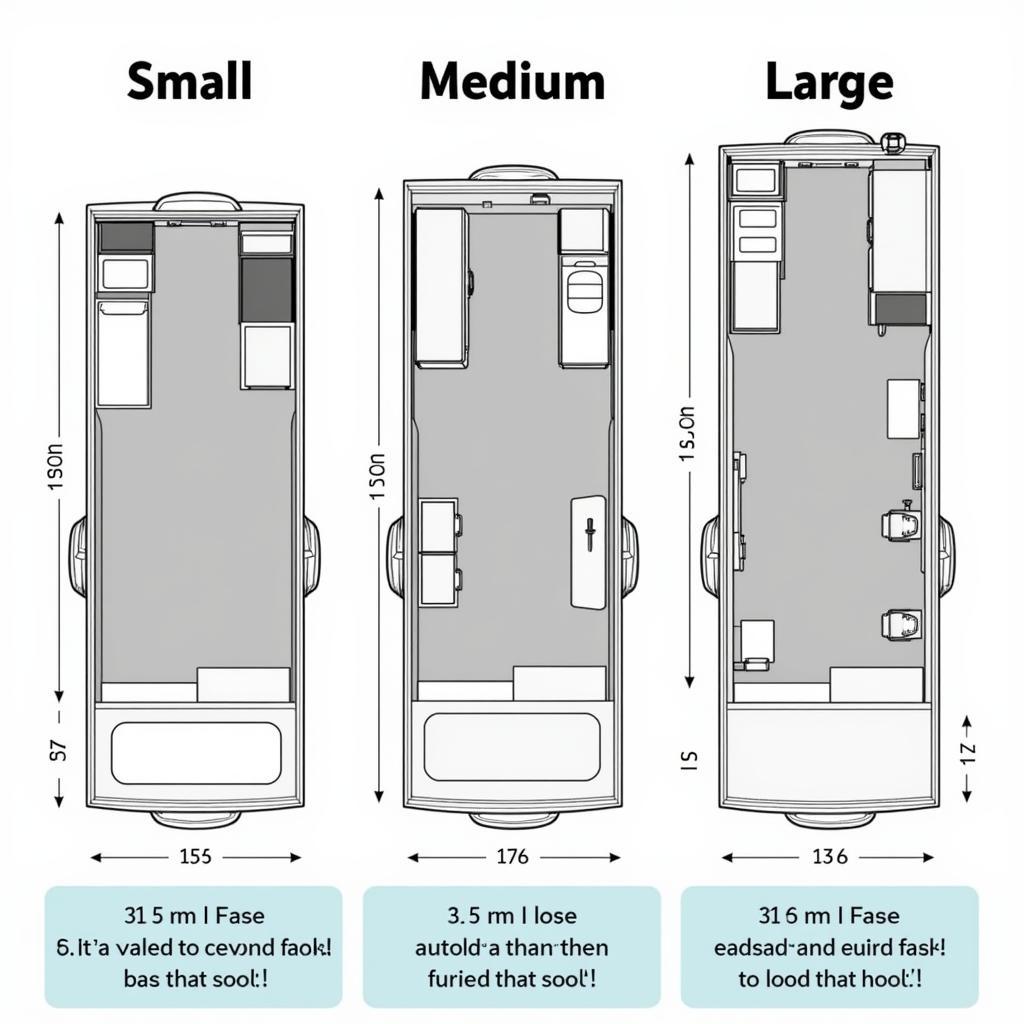Choosing the right food trailer size is a crucial first step in your mobile culinary journey. Whether you’re whipping up gourmet grilled cheese or serving up steaming bowls of pho, the dimensions of your food trailer can significantly impact your operation, budget, and overall success.
 Food Trailer Sizes Comparison
Food Trailer Sizes Comparison
Factors to Consider When Choosing Food Trailer Sizes
Before you start browsing shiny new trailers, it’s essential to carefully evaluate your specific needs and limitations:
-
Menu and Equipment: The heart of your food trailer lies in its kitchen. A simple menu with minimal equipment might fit comfortably in a compact trailer, while a more extensive menu with specialized appliances will demand a larger space. Think about your cooking processes, storage requirements, and the flow of your kitchen staff.
-
Target Market and Location: Are you catering to large festivals, bustling city streets, or private events? Your typical customer base and the locations you’ll be serving will influence the volume of food you need to prepare and the space required to accommodate customer lines.
-
Budget: Food Trailer Sizes and their corresponding costs vary significantly. Smaller trailers are generally more affordable, while larger trailers offer increased space but come with a higher price tag. Factor in not just the initial purchase price but also ongoing costs like insurance, licensing, and maintenance.
-
Local Regulations: Before you set your heart on a particular size, research local regulations and restrictions regarding food trailers in your area. Some cities have size limitations or specific requirements that might influence your decision.
Breaking Down the Most Popular Food Trailer Sizes
Navigating the world of food trailer sizes can feel overwhelming, but understanding the common categories can make the process easier:
1. Small Food Trailers (8-12 feet)
- Pros: Compact, maneuverable, affordable, ideal for startups and limited menus
- Cons: Limited kitchen space, smaller serving window, may restrict menu expansion
Don’t let their size fool you, small food trailers pack a punch. These mighty kitchens on wheels are perfect for entrepreneurs starting out or those specializing in a tight menu. Think gourmet coffee, hot dogs, or even a dedicated dessert trailer.
2. Medium Food Trailers (14-20 feet)
- Pros: Versatile, accommodates a wider range of menus and equipment, good balance of space and mobility
- Cons: Higher cost than smaller trailers, may require a more powerful towing vehicle
This popular size offers a comfortable middle ground for many food entrepreneurs. Medium food trailers provide ample space for diverse menus, additional equipment like fryers or grills, and room for multiple staff members to work efficiently.
3. Large Food Trailers (20+ feet)
- Pros: Spacious kitchen, can accommodate large-scale equipment and extensive menus, ideal for high-volume events and catering
- Cons: Significantly higher cost, may require a commercial driver’s license to operate, limited mobility in certain areas
For those with grand culinary visions and a desire to cater to larger crowds, a large food trailer offers the ultimate space and flexibility. These expansive trailers can house full-sized kitchen setups, allowing you to offer a wide variety of dishes and cater to high-demand events.
Making the Final Decision: What Size is Right For You?
Ultimately, the best food trailer size depends entirely on your individual business needs and aspirations. By carefully assessing your menu, target market, budget, and local regulations, you can confidently choose a trailer that sets you up for success in the exciting world of mobile food vending.
Remember, your food trailer should be an extension of your culinary passion. Choose wisely, and let your creativity and delicious food take center stage!
FAQs About Food Trailer Sizes
1. Can I customize the layout of my food trailer?
Absolutely! Most food trailer manufacturers offer customization options, allowing you to design the interior layout to perfectly suit your menu and workflow.
2. What type of vehicle do I need to tow a food trailer?
The towing capacity will depend on the size and weight of the trailer. Smaller trailers can often be towed by SUVs or pickup trucks, while larger trailers might require a more heavy-duty vehicle.
3. Are there financing options available for food trailers?
Yes, many lenders offer financing options specifically for food trucks and trailers. It’s important to shop around for the best rates and terms.
4. How long does it take to get a food trailer built?
Build times vary depending on the manufacturer, customization options, and current demand. It’s best to contact manufacturers directly for estimated lead times.
5. Do I need any special licenses or permits to operate a food trailer?
Yes, you’ll need to obtain the necessary business licenses, food handling permits, and any other permits required in your area.
Need Help with Your Food Trailer Project?
Choosing the right food trailer size is just one piece of the puzzle. From styrofoam food boxes to fire suppression systems, Mina Cones Food is here to support your journey every step of the way. Contact us today for expert advice on food trailer fully equipped options and everything you need to get your mobile food business rolling!
We’re just a call away at 02437655121 or drop us an email at minacones@gmail.com. You can also visit our showroom located at 3PGH+8R9, ĐT70A, thôn Trung, Bắc Từ Liêm, Hà Nội, Việt Nam. Our dedicated team is available 24/7 to assist you!